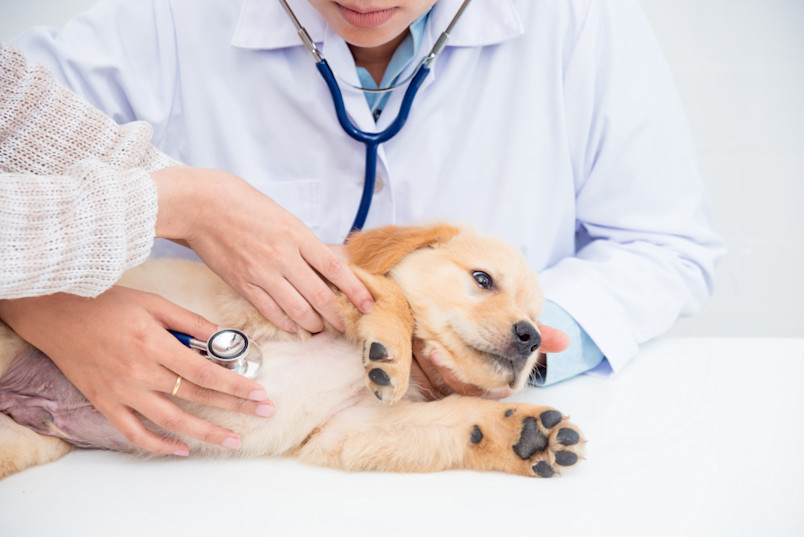
Puppy vomiting is so common, it's practically a rite of passage for new dog owners. But that doesn't mean it's any less frustrating or worrisome when it happens. In fact, it can be downright scary, especially if you're not sure what's causing it. Whether your dog is vomiting food, bile, or blood, it’s important to identify the cause as quickly as possible.
Just as with humans, a puppy vomiting can signal something as simple as a queasy stomach or a bigger issue like an infection or intestinal blockage. Figuring out why your puppy keeps throwing up can help you address the problem effectively.
For instance, eating or drinking something poisonous or toxic can be an immediate concern. If your puppy has eaten chocolate, which is toxic to dogs, it's crucial to be aware of the signs of chocolate poisoning in dogs. And in such cases, or if they've ingested chemicals such as antifreeze, you’ll need to get them to an emergency veterinarian immediately. However, if the puppy has simply developed motion sickness from a car ride or eaten a big meal, the vomiting may pass on its own.
Common Causes of Puppy Vomiting
Is it common for puppies to throw up? Absolutely. Just like human babies and toddlers, puppies are still learning what they can eat and how they should eat it. They tend to explore new things by mouthing and chewing on them, and they also have big appetites. Sometimes they eat things that can upset their stomachs. Let’s take a look at some of the specific causes of a puppy vomiting.
They may have eaten too much. A puppy throwing up food may have simply eaten more than they should have. Even if you’ve been feeding your pet nutritious puppy food, they may vomit if they overindulge, especially if they don’t take time to let their food settle before playing and rough-housing.
They may have eaten too fast. Young, hungry puppies may swallow their food quickly instead of chewing it. Eating quickly also means they swallow a bunch of air. Lots of air and poorly chewed food can lead to regurgitation or vomiting not long after they have eaten.
Your puppy may have eaten something they shouldn’t have. Dogs can occasionally ingest dangerous substances or toxins, even if these items aren’t toxic to people. Mothballs, antifreeze, drugs like nonsteroidal anti-inflammatory drugs (e.g. ibuprofen), certain plants (e.g. sago palms), and some people foods (e.g. grapes, chocolate, foods with the artificial sweetener xylitol) are all toxic to dogs and can cause vomiting. Some things that a puppy might eat can be irritating to their stomach lining, which can cause them to vomit once or twice then be fine. Examples include grass or very small amounts of fibers off of a tennis ball or stuffed toy.
They may be stressed or anxious. While you may think your puppy has a carefree life, dogs experience stress and anxiety just like we do. Loud noises like fireworks and heavy construction can increase anxiety in dogs, and they may vomit when they encounter these noises. Dogs with separation anxiety may vomit when left alone. Learning how to calm an overstimulated puppy can help reduce vomiting in these types of situations.
Your puppy may have a parasite. Gastrointestinal parasites such as stomach worms, hookworms, or roundworms can cause vomiting in dogs. If your dog has a gastrointestinal (GI) parasite infection, you may see them in your dog’s vomit or feces. These worms are white, pinkish, or tan-colored. Understanding signs of worms in dogs poop is helpful for your pup, since parasitic infections can often cause vomiting and other digestive issues in puppies.
The fecal exam your veterinarian gives your dog at puppy visits and each year for their annual check up will detect most intestinal worms, but it won’t usually detect stomach worms. If this is the source of your dog’s vomiting, they may need to undergo more specific tests to diagnose it.
Some GI parasites can be passed to your puppy via their mother or they can be picked up from your backyard and other dog’s feces. Some dogs may have such a severe infection of intestinal parasites that their intestines can become blocked; however, these dogs act very ill, with no appetite, straining to have a bowel movement, laying around, and not wanting to play at all.
Your puppy may have a viral or bacterial infection. Just like humans, dogs can contract bacteria and viruses, some of which can cause pretty severe vomiting as well as other signs. Parvovirus is a deadly virus that typically affects unvaccinated puppies in the first few months of their lives, but there are several other, less severe viruses and bacterial infections that puppies can catch, especially if not up to date on vaccinations. Severe puppy vomiting may be attributed to parvovirus, and prompt medical attention is necessary.

They may have developed GI inflammation or pancreatitis. Sometimes when a puppy eats the wrong thing, the good bacteria in their GI tract get taken over by bad bacteria, resulting in gastroenteritis. Their pancreas can become irritated as well, resulting in a condition called pancreatitis. This is especially true if your pup feasts on fatty foods and table scraps. Both conditions can cause severe tummy pain, vomiting, and diarrhea.
Your puppy may have a stomach or intestinal blockage. We’ve all heard about dogs swallowing small toys or strings by accident. But there are many everyday objects that can cause intestinal blockages. If your pet is exhibiting general puppy teething symptoms, they may be more likely to chew on objects around the house, which increases their risk of eating something that they aren’t able to pass.
Identifying the Type of Dog Vomit
“My puppy is throwing up. What do I do?” You may be surprised that the first step to answering this question is an unpleasant one. You’ll need to inspect your dog’s vomit. The color and consistency of your puppy’s throw up, as well as what you find in it, can give you clues as to the cause of their condition.
If your dog is vomiting a yellow foam-like substance, they’re likely vomiting bile. Bile is a fluid produced by the liver, which helps with digestion. A puppy who is vomiting bile most likely has an empty stomach. This could be a sign that they are nauseous from not eating or it could be a sign associated with a more troubling onset (e.g. GI infection or inflammation), and possibly that they don’t feel well and haven’t wanted to eat. Motion sickness can also cause this kind of vomiting. If you know your pet ate recently but they are vomiting bile, it could be that they have already thrown up multiple times and no longer have anything left in their stomach.
Vomit consisting of a small amount of white foam can signal a few different things. Sometimes it is an indicator of an episode of acid reflux and is of little concern. It can also mean that your dog has already vomited several times and there isn’t much left in their tummy. Coughing and respiratory tract infections can cause coughing to the point of gagging, commonly resulting in vomiting small amounts of white foam. Gagging or trying to throw up with little success, such as with a blockage or bloat, can also lead to this type of vomit consistency. Rarely, vomiting white foam can be associated with rabies, a fatal central nervous system infection. If your pup is up to date on their rabies vaccine this shouldn't be a concern.
Some dogs may vomit or regurgitate undigested food. Bits of food in your dog’s throw up can mean something they ate didn’t agree with them. They may have eaten too much or consumed too much fat at once. Rich human food can make your dog sick, so keep the hamburgers and hot dogs to yourself.
Blood in your dog’s vomit can be alarming. Small specks of blood can happen when your dog’s esophagus gets irritated (e.g. if they chew a sharp stick) or if they have been teething, but large amounts of blood can point to internal bleeding or an ulcer. Don’t panic if you see a red tinge to your dog’s throw up. Sometimes their dog food or treats have red dyes which can appear alarming on the way back up but are not as concerning as true blood in the vomit.
Any items you see in your dog’s vomit other than spit, bile, or food should also be clues to the problem. Candy wrappers, bed stuffing, bones, garbage, and bits of rope from toys are important to take note of and tell your veterinarian.
Signs Your Puppy Needs a Veterinarian’s Attention for Throwing Up
Pet owners often worry about their dog’s health, and that’s a natural part of being a dog parent. Many times, your dog may be vomiting from mild nausea or eating grass.

There are some signs, however, that should be considered red flags for pet owners. If your puppy exhibits any of the following problems, you’ll want to schedule an appointment right away:
Frequent vomiting
Projectile vomiting
Weakness or lethargy
Blood in their vomit or stool
Vomiting combined with diarrhea
Poor appetite
While vomiting one time isn’t often a cause for major concern, excessive or forceful vomiting can quickly lead to dehydration. When coupled with diarrhea, your dog can lose strength and become dehydrated very quickly.
Diagnostic Tests and Treatments When Your Puppy Keeps Throwing Up
Depending on your pet’s signs, your veterinarian may order one or more tests. They’ll take into consideration the frequency and type of vomiting. While you may cringe at the thought, taking pictures of your dog’s vomit and bringing them to the appointment can help your vet make a more informed treatment decision.
Ultrasound, X-rays or radiographs, and bloodwork are just a few examples of the kind of medical procedures your dog’s vet may carry out. Ultrasound and X-rays are useful ways of examining your dog’s belly and GI tract. These scans can help reveal if your dog has a blockage from a foreign object (like a toy or other item). Bloodwork will help your veterinarian determine the cause of vomiting as well as how their internal organs and hydration status are faring. Fecal tests can help identify if any parasites are present or what types of bacteria are in your dog’s GI tract.
If your dog has vomited several times, your veterinarian may keep your puppy in the hospital and administer intravenous (IV) fluids to rehydrate them. They may also prescribe and/or administer antibiotics, anti-nausea medications, and gastroprotectants, depending on what is wrong with your pup.
In the most extreme cases, a veterinarian may need to perform surgery. If your puppy has been vomiting because they swallowed a foreign object, a stomach or intestinal blockage may only be resolved via surgery.
Diet change may also be helpful. Many veterinarians will start nauseous pups on a bland or medicated GI diet that are gentle on the tummy while they heal. For dogs that have vomiting episodes frequently, the vet may recommend a special diet as a long-term solution to prevent reoccurence. Your dog’s feeding routine may also need to be adjusted- smaller, more frequent meals may help prevent overeating. A slow-feeder dog bowl can also help fast eaters slow down.
Preventative Measures and Tips to Prevent Puppy Vomiting
While seeing your dog throwing up can be scary, there are some steps you can take to prevent it from happening in the future. Always consult your veterinarian before making any adjustments to your dog’s diet or healthcare routine.
Try using treat toys to keep your dog from eating treats all at once.
Skip the people food and table scraps, especially in young puppies. If your dog gives you ‘sad eyes’ during dinner, you can offer them small bits of dog treats instead of what is on your plate.
When switching your puppy’s food, don’t do it all at once. Mix the original food and the new food together, slowly adding more of the new food each day.
Monitor your dog for signs of illness. If they seem more tired than usual, have diarrhea, don’t want their normal food, or have eaten anything suspicious, check with your veterinarian.
One of the best financial and health decisions you can make for your pet is to enroll them in puppy pet insurance. Embrace Pet Insurance covers accidents, illnesses, and conditions like many of those that can cause vomiting. Any scheduled and emergency surgeries may also be covered under their plan.
Embrace Pet Insurance also offers puppy wellness plan options. These plans can help you afford the regular care your puppy needs. Puppy dental insurance is also part of your pet insurance plan at Embrace.
So, Why is My Puppy Throwing Up?
The next time you wonder, “Why is my puppy throwing up?,” take a moment to consider the color and consistency of your dog’s vomit. Discerning whether bile, undigested food, or blood is present in the vomit can help determine the cause of your dog’s condition. Take note of other signs your dog is showing- are they acting puny or weak? Not wanting to eat? Having diarrhea or loose stool?
Always consult a veterinarian if you’re concerned about your puppy throwing up. Only a licensed veterinary medical professional can make a proper diagnosis and provide treatment. Frequent vomiting or vomiting that’s accompanied by diarrhea and/or a poor appetite are signs you need to schedule an appointment with a veterinarian right away.
Puppies are a lot of work and cause plenty of stress, but their companionship is so incredibly rewarding. When they become ill, it can be very worrisome. If you're doing your best to look after your puppy and provide them with the best possible care, then you're doing a great job. Just remember, this too shall pass.